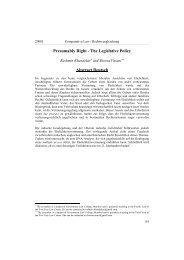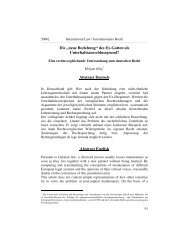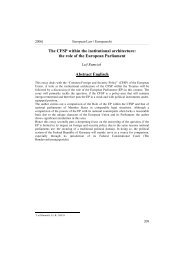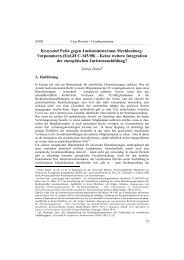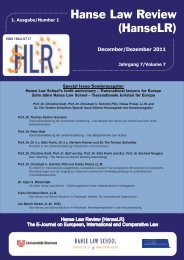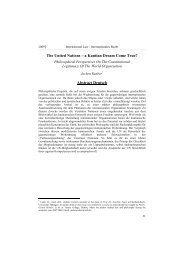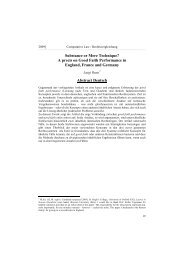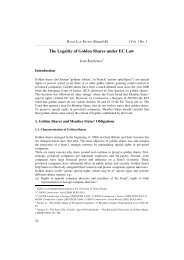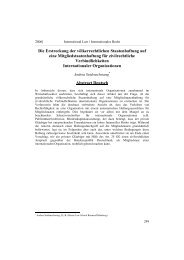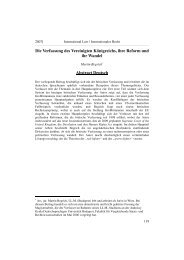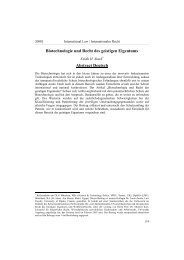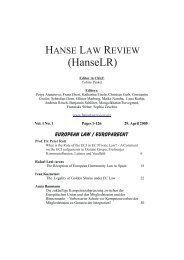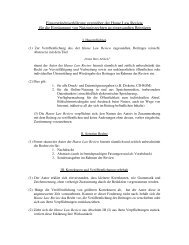The United Nations – a Kantian Dream Come True? - Hanse Law ...
The United Nations – a Kantian Dream Come True? - Hanse Law ...
The United Nations – a Kantian Dream Come True? - Hanse Law ...
Create successful ePaper yourself
Turn your PDF publications into a flip-book with our unique Google optimized e-Paper software.
2009] International <strong>Law</strong> / Internationales Recht<br />
___________________________________________________________________________________________________________________________________________________<br />
to elaborate on characteristics and competences of the world republic and expand the<br />
picture beyond the abovementioned paralogism.<br />
‘<strong>The</strong> civil constitution of every state shall be republican’ 139 <strong>–</strong> I have already argued that the<br />
analogy between the state of nature among individuals and the state of nature among states<br />
leads to the republic requirement on a world level. <strong>The</strong>refore what is true for the domestic<br />
republic must analogously be true for the world republic. Kant’s description of a republic<br />
reads as follows: ‘A republican constitution is founded upon three principles: firstly the<br />
principle of freedom for all members of society [...]; secondly, the principle of the<br />
[derivation of all legal acts from, 140 and the] dependence of everyone upon a single<br />
common legislation; and thirdly, the principle of legal equality for everyone.’ 141<br />
Considering Kant’s explanatory notes and his remarks in <strong>The</strong> Metaphysics of Morals and<br />
<strong>The</strong>ory and Practice, 142 by republican Kant referred to what we would call today a<br />
constitutional liberal democracy providing full respect for human rights. Thus a republican<br />
constitution can be characterised by four elements: 143<br />
(1) Respect for inalienable human rights,<br />
(2) the principle of popular sovereignty,<br />
(3) Equality before the law, and<br />
(4) Separated public powers enforcing the abovementioned rights.<br />
Transferring this conception to the level of a peoples’ republic poses no difficulty for the<br />
elements (3) and (4): <strong>The</strong> republic of republics must have independent legislative, executive<br />
and judicial institutions exercising public power and enforcing a legal system granting<br />
equal rights and duties to each of its member states.<br />
Likewise the second republican feature, popular sovereignty, can be applied to the global<br />
context without serious intellectual challenges. It stipulates that like citizens in a domestic<br />
order, on a global level states are entitled ‘to obey no external laws except those to which<br />
[they] have been able to give [their] own consent.’ 144 While within the domestic state all<br />
state authority is derived from the people consisting of individual persons, within the world<br />
republic the people of states has to be the holder of all state authority. 145 Of course, when it<br />
comes to the genesis of obligations, for Kant too, this implies neither a strict universal<br />
consensus requirement, nor direct democratic structures. Even in Kant’s visionary mind,<br />
this would be utopian. Rather he imagined decisions to be made and legislative acts to be<br />
passed by elected representatives on the basis of certain majority rules, provided however<br />
that these latter rules could follow from an contractus originarius or pactum sociale as ‘the<br />
test of the rightfulness of every public law’. 146 Hence, the validity of every constitution is<br />
not simply presupposed but has to be tested by the intellectual device of the social contract:<br />
could free and rational persons in a state of nature universally agree on this particular<br />
constitution?<br />
139 Kant, ‘Perpetual Peace’, 99 (italics added).<br />
140 Kant, ‘On the Common Saying’, 77 f.; Tesón, ‘<strong>The</strong> <strong>Kantian</strong> <strong>The</strong>ory of International <strong>Law</strong>’, 66.<br />
141 Kant, ‘Perpetual Peace’, 99.<br />
142 See esp. the footnote at Kant, ‘Perpetual Peace’, 99 and §§ 45 et seq. of Kant, ‘<strong>The</strong> Metaphysics of Morals’,<br />
138 ff.<br />
143 See Höffe, ‘Völkerbund oder Weltrepublik?’, 119; Höffe, ‘Ausblick: Die Vereinten Nationen im Lichte Kants’,<br />
246 and Magnis-Suseno, 68 f.<br />
144 Kant, ‘Perpetual Peace’, 99.<br />
145 Höffe, ‘Ausblick: Die Vereinten Nationen im Lichte Kants’, 261.<br />
146 Kant, ‘On the Common Saying’, 79.<br />
67



